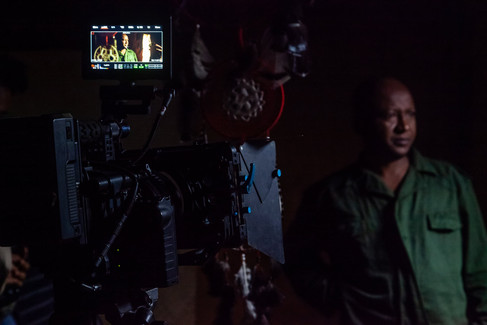Africa: the challenge of conquering rights in a developing audiovisual industry
- Sep 5, 2023
- 4 min read

In a continent as vast and diverse as Africa, the audiovisual industry is going through a significant growth. However, behind the screens, directors and screenwriters are facing huge challenges when it comes to the recognition of their rights as authors.
With different circumstances and realities in the 54 countries of the continent, the efforts to set strong and equitable regulations for audiovisual creators is in progress, with initiatives like the Pan African Alliance of Screenwriters and Filmmakers (APASER), which has more than 13,000 members in 29 countries currently.
“One of the challenges the audiovisual industry has faced in Africa is the lack of documentation on the works conducted, which hinders the remuneration process and the enforcement of laws. From the around 30 countries, where there are Collective Management Organizations (CMOs), only 12 of those organizations manage the payments for audiovisual works”, the director and screenwriter, Laza Razanajatovo, President of APASER and Institutional Coordinator of AVACI, explained.
Different countries, similar problems
Each African country has its own history and context concerning authors’ rights for audiovisual creators. In nations such as Nigeria, which hosts the flourishing industry of “Nollywood”, with successful films like The King’s Horseman, directed by Biyi Bandele, which can be seen in the Netflix platform, filmmakers are struggling to obtain a fair remuneration for their work, in spite of the constant production of films and series.
The King’s Horseman (2022), directed by Biyi Bandele
Senegal is other country that has shown development in the audiovisual industry during recent years. Without going further, the feature film Banel & Adama, by the French-Senegalese director, Ramata-Toulaye Syrodado, filmed in the arid north of such country, managed to be nominated to the Palme d’Or at the last Cannes Film Festival.
Banel & Adama (2023), directed by Ramata-Toulaye Syrodado
“The main problem lies in the lack of documentation to identify who has performed each work, which makes it difficult to state remunerations later and to apply the law. Moreover, it is hard to identify where the works had been communicated, to retrieve rights and, finally, to compensate creators. In this context, APASER has emerged as an effective response to those needs”, Razanajatovo sustained.
In Ghana and in Kenya, the absence of strong regulations makes it hard for audiovisual creators to receive the fair recognition and remuneration they deserve and that is why directors and screenwriters have grouped together to achieve –little by little - such recognition.
In a scenario with significant difficulties, workers, screenwriters and directors of the audiovisual sector in Africa have expressed urgent concerns that affect their work and rights. Such professionals, often overlooked, are speaking out in pursuit of solutions for the challenges they confront in their respective roles.
“Another problem is the lack of proper follow-up concerning the distribution and communication of works. Screenwriters and directors are dealing with difficulties to track down the different screenings of our movies. In some occasions, if producers cannot perform an effective follow-up, they give up trying, leading to a growing concern about authors’ rights”, the director, Cheick Oumar Sissoko, Secretary General of the Pan African Federation of Filmmakers FEPACI from Mali, asserted.
Laza Razanajatovo, president of APASER Cheick Sissoko, general secretary of FEPACI
In this sense, the Pan African Alliance of Screenwriters and Filmmakers (APASER) plays a key role in the transformation process of this reality. As the continent comes together to face challenges, the entity is working with the support of the International Confederation of Audiovisual Authors (AVACI) to address legal gaps and to provide a platform for the defense of authors’ rights throughout Africa.
“The lack of knowledge about authors’ rights and the poor understanding of rights related to scripts and authorship in general, create a complicated area for those who are starting their careers in the audiovisual production. The commercial exploitation of works and the management of authors’ rights also tend to be complex issues”, Axmel Renée Compaore, Director of the Bureau of Authors’ Rights division from Burkina Faso (BBDA), declared.
The importance of APASER
Apart from the internal challenges, a bigger question arises: the difficulty to collect and enforce authors’ rights in a region as diverse and immense as Africa. Professionals from the audiovisual field are faced with the problem of identifying appropriate bodies to manage and protect their rights, a process that changes significantly from one country to the other.
That is why one of the main goals of APASER is to state fair rules for the remuneration and recognition of creators. Through efforts made to document and protect the work of artists, the entity seeks to strengthen the position of African creators in the audiovisual industry by providing training and networking opportunities. APASER has the purpose to empower directors and screenwriters so that they can defend their rights of authors.
“Even though there have been advances, the road ahead is significant. The lack of knowledge on authors’ rights and the shortage of professionals to support creators in the industry prevail. The lack of effective systems to trace and manage authors’ rights is still a major challenge in many countries”, Razanajatovo affirmed.
Although the situation of audiovisual creators in Africa is diverse and complex, initiatives like the ones of APASER are creating bridges for a fairer industry. With a great number of nations, languages and cultures, the path to transformation is challenging but necessary. The international cooperation, as proposed by the International Confederation of Audiovisual Authors (AVACI), as well as the local commitment, are key to achieve a positive change in the film and series industry across the continent.
In the current context, western festivals and production companies demonstrate a remarkable interest in African contents. “There have never been so many Afro-futurist films. Platforms have realized that Africa is a great market now they have reached their limit in other continents”, the Mozambican director, Pedro Pimenta, Unesco consultant on African audiovisual affairs, told the Spanish newspaper El País.
From Nigeria to Mauritius, from Togo to Kenya, the struggle for authors’ rights and the recognition of audiovisual creators in Africa is a joint effort. As organizations like APASER work to unify filmmakers and screenwriters under a common cause, the film and series industry in Africa is going through a remarkable evolution that promises to provide voice and value to the creators who enrich the screens in the continent.





















Comments